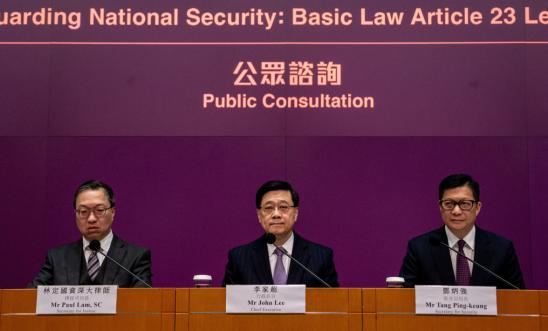
Press releases
Hong Kong: Article 23 legislation takes repression to the ‘next level’

Activists could be prosecuted for interacting with foreign organisations
Hong Kong authorities label Amnesty as an anti-China organisation
‘The extraterritorial reach of this legislation would leave no one safe from being labelled a threat to national security’ - Sarah Brooks
Responding to the release of the full draft text of Hong Kong’s new national security law, known locally as Article 23 legislation, Sarah Brooks, Amnesty International’s China Director, said:
“The Hong Kong government, having already presided over an erosion of human rights in the city with the Beijing-imposed 2020 National Security Law, is now taking repression to the next level.
“The rapid progression of legislation under Article 23 shows the Government’s eagerness to further dismantle human rights protection and turn its back on its international obligations.
“This legislation imports mainland Chinese legal concepts of ‘national security’ and ‘state secrets’ directly into Hong Kong law in a way that is deeply disturbing for the city’s future.
“The new vague and broadly worded crime of ‘external interference’ could lead to the prosecution of activists for their exchanges with foreign actors, framed as ‘endangering national security’. Meanwhile, the right to a fair trial comes under increasing attack with new investigatory powers allowing for detention without charge for 16 days and denial of access to a lawyer.
“The apparent overarching purpose of Article 23 is to stifle any and all criticism of the Chinese and Hong Kong authorities and their policies, within the city and globally. The extraterritorial reach of this legislation would leave no one safe from being labelled a threat to national security.
“The Hong Kong government’s laughable announcement that its public consultation showed 98.6% support for Article 23 proposals – in an environment where dissent means risking jail – reads like a desperate attempt to claim legitimacy. In reality, this legislation further undermines Hong Kong’s global status.
“We urge the authorities to step back from the brink and halt the current legislative process.
“The international community, including governments, the EU and the UN, must make it clear to the Hong Kong government that moving forward with Article 23 would be a grave mistake and lead to violation of human rights.”
New bill increases repression powers
Article 23 of the Basic Law, Hong Kong’s mini-constitution, requires the Government to pass local laws to prohibit treason, secession, sedition, subversion against the Central People’s Government; theft of state secrets; prohibit foreign political organisations or bodies from conducting political activities in the territory; and prohibit political organisations or bodies of the territory from establishing ties with foreign political organisations or bodies.
The full draft text of the new legislation, named the Safeguarding National Security Bill, was released today just eight days after the end of a one-month public consultation that was claimed to have resulted in more than 13,000 submissions.
Consultation rejects Amnesty’s analysis
Amnesty’s 34-page submission during the consultation process was labelled by the Hong Kong Security Bureau as coming from an external ‘anti-China’ or ‘anti-government’ organisation and therefore apparently dismissed. It analysed the proposed legislation’s compliance with Hong Kong’s human rights obligations and found many of the proposals are contrary to international human rights laws and standards and its definition of national security is overly broad and both the new and amended offences lack legal clarity and are not necessary nor proportionate for legitimate national security reasons. The submission stated that proposed procedural changes would lead to violations of human rights.
Amnesty recognises that every government has the right and duty to protect its citizens and all others subject to its jurisdiction, and that some jurisdictions have specific security concerns. However, these may never be used as an excuse to deny people the right to express different political views and to exercise their other human rights as protected by international legal standards.